- Home
- Medical news & Guidelines
- Anesthesiology
- Cardiology and CTVS
- Critical Care
- Dentistry
- Dermatology
- Diabetes and Endocrinology
- ENT
- Gastroenterology
- Medicine
- Nephrology
- Neurology
- Obstretics-Gynaecology
- Oncology
- Ophthalmology
- Orthopaedics
- Pediatrics-Neonatology
- Psychiatry
- Pulmonology
- Radiology
- Surgery
- Urology
- Laboratory Medicine
- Diet
- Nursing
- Paramedical
- Physiotherapy
- Health news
- Fact Check
- Bone Health Fact Check
- Brain Health Fact Check
- Cancer Related Fact Check
- Child Care Fact Check
- Dental and oral health fact check
- Diabetes and metabolic health fact check
- Diet and Nutrition Fact Check
- Eye and ENT Care Fact Check
- Fitness fact check
- Gut health fact check
- Heart health fact check
- Kidney health fact check
- Medical education fact check
- Men's health fact check
- Respiratory fact check
- Skin and hair care fact check
- Vaccine and Immunization fact check
- Women's health fact check
- AYUSH
- State News
- Andaman and Nicobar Islands
- Andhra Pradesh
- Arunachal Pradesh
- Assam
- Bihar
- Chandigarh
- Chattisgarh
- Dadra and Nagar Haveli
- Daman and Diu
- Delhi
- Goa
- Gujarat
- Haryana
- Himachal Pradesh
- Jammu & Kashmir
- Jharkhand
- Karnataka
- Kerala
- Ladakh
- Lakshadweep
- Madhya Pradesh
- Maharashtra
- Manipur
- Meghalaya
- Mizoram
- Nagaland
- Odisha
- Puducherry
- Punjab
- Rajasthan
- Sikkim
- Tamil Nadu
- Telangana
- Tripura
- Uttar Pradesh
- Uttrakhand
- West Bengal
- Medical Education
- Industry
Coffee first line therapeutic option for a form of dyskinesia

Dyskinesias are a group of rare disorders characterised by sudden, involuntary movements that can affect the whole body. One of the causes of this condition is a mutation in the ADCY5 gene, which starts mainly in childhood. These abnormal movements are often exacerbated in the form of paroxysmal movement disorders that can occur during the day, but also at night. Despite numerous explorations of the potential benefits of drug treatments, until recently no treatment has been confirmed to be effective in this condition.
Two years ago, a long-standing study by Prof. Emmanuel Flamand-Roze and Dr. Aurélie Méneret highlighted the benefit of caffeine on the symptoms of a child suffering from dyskinesia associated with the ADCY5 gene mutation.
In order to confirm these results, the team from the Paris Brain Institute, the neurology department of the Pitié-Salpêtrière AP-HP hospital and Inserm conducted a retrospective study on a worldwide scale. The researchers were able to collect data from 30 patients affected by this rare condition who had consumed or were still consuming coffee for their dyskinesia.
Their results show that, in addition to a good tolerance of caffeine intake, including in children, 87% of patients reported a clear improvement in their motor symptoms. Coffee consumption not only reduced the frequency and duration of paroxysmal movement disorders, but also reduced their baseline movement disorders, as well as other symptoms such as gait, attention and concentration disorders, certain types of pain or hypotonia, with a notable improvement in the patients' quality of life. This retrospective study thus confirms the potential of caffeine as a first-line treatment in this form of dyskinesia.
The efficacy of coffee can be explained by the fact that caffeine binds to adenosine receptors that modify the function of the dysfonctional protein (ADCY5). The latter is strongly located in the striatum of the brain, which is involved in motor control. Researchers and clinicians at the Paris Brain Institute are currently exploring the interest of the cyclic adenosine monophosphate (cAMP) pathway as a therapeutic target in this disease and more widely in pathologies associated with hyperkinetic movements.
Our findings suggest that caffeine should be considered as a first-line therapeutic option in ADCY5-related dyskinesia, report researchers.
To read the full article, click on the following link:
Dr Kamal Kant Kohli-MBBS, DTCD- a chest specialist with more than 30 years of practice and a flair for writing clinical articles, Dr Kamal Kant Kohli joined Medical Dialogues as a Chief Editor of Medical News. Besides writing articles, as an editor, he proofreads and verifies all the medical content published on Medical Dialogues including those coming from journals, studies,medical conferences,guidelines etc. Email: drkohli@medicaldialogues.in. Contact no. 011-43720751


